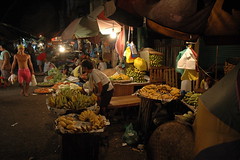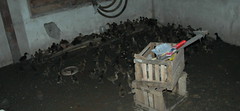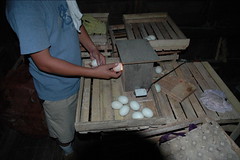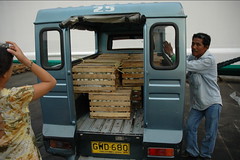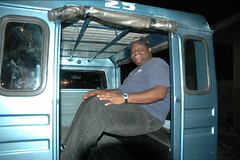Not for the timid. I ventured out at past 11pm to a place that only locals go. This is Carbon street market. A market that is there all day but comes alive after the sun goes down. Here the locals and many people that have relocated to Cebu shop for fruits, vegetables and other edibles. Foreigners are a rare site here, as most wont venture this far due to the unsavory crowd the one might find. My girlfriend���s cousins escorted me as they did shopping there for their canteen. It was an experience as everywhere I turned I felt as if I was the main attraction of the night. This usually happens when I venture out to somewhere new in this country.
Sunday, June 19, 2005
Monday, June 06, 2005
Baby Ducks - Itik
These are the ducks that are birn if the eggs reach thier full maturity before they are sold and eaten. The idea behind having so many ducks as to stop having to get our eggs shipped from Manila. We are now on our way to that with 150 baby ducks ready to become egg producers.
Checking the eggs
My partner checks the current supply of eggs for age. If the egg is clear it is usually sellable as. As the egg starts to age, you must constantly check them as it will reach certain stages that make it unsellable or more of a delicacy as the baby embryo develops.
The selected eggs are first incubated between bags of toasted palay (whole rice grains with husk) or ipa (rice husk) to stimulate the body temperature of the mother duck (42½C). The set-up is then layered with sako (burlap bags) to serve as insulators. Complete development or hatching takes place within 28 days of incubation. After six days the eggs are tested and those discovered to be infertile are itlog na maalat (salt-cured) or sold as sariwa (fresh). Those which are fertile but have failed to develop at normal speed are detected and separated on the 14th day of incubation. They are boiled and sold as penoy. Their appearance is similar to a hard-cooked duck egg. Eco, those containing dead embryos, are spoiled and have no market value.
The selected eggs are first incubated between bags of toasted palay (whole rice grains with husk) or ipa (rice husk) to stimulate the body temperature of the mother duck (42½C). The set-up is then layered with sako (burlap bags) to serve as insulators. Complete development or hatching takes place within 28 days of incubation. After six days the eggs are tested and those discovered to be infertile are itlog na maalat (salt-cured) or sold as sariwa (fresh). Those which are fertile but have failed to develop at normal speed are detected and separated on the 14th day of incubation. They are boiled and sold as penoy. Their appearance is similar to a hard-cooked duck egg. Eco, those containing dead embryos, are spoiled and have no market value.
Balut loaded and ready to go
BALUT - The wayward nature of the itik (native Filipino duck) must be the reason for an unusual Filipino delicacy - balut - a fertilised egg with a partially developed duckling, which is eaten boiled. Balut is a very nutritious snack food, which most Filipinos appreciate. However, non-Filipinos generally take a bit of convincing before taking their first bite.
I have invested in this business with my friends brother. There is a huge market in this country for the duckling eggs. Especially in provinces where supplies are thin. Cebu is one of the islands with several little small towns that don't have the commerce do have everything Manila or even Cebu City would have. Our day started with a trip to the pier to pick the lastest shipment of Balut, which would last approximately 3 days then it would be time to get more. The eggs are shipped from Manila by ship and then transported by a small truck or Jeepney. It is sold on the streets by vendors who pick up theirt supply from my partner.
I have invested in this business with my friends brother. There is a huge market in this country for the duckling eggs. Especially in provinces where supplies are thin. Cebu is one of the islands with several little small towns that don't have the commerce do have everything Manila or even Cebu City would have. Our day started with a trip to the pier to pick the lastest shipment of Balut, which would last approximately 3 days then it would be time to get more. The eggs are shipped from Manila by ship and then transported by a small truck or Jeepney. It is sold on the streets by vendors who pick up theirt supply from my partner.
First ride in a Jeepney
I have said since I have been in the Philippines that I would never ride in a Jeepney. Well never is a prtetty big word. For those that know I am a pretty big guy and I tower over most vehicles in this country. I was in a province called Liloan, where a business I have invested in resides. We were delivery Balut to the storage place and my partner wanted to show me the small province, or town as it would be called in the US. So I climbed int eh bacl of the Jeepney we had rented for the delivery run from Cebu City to Liloan. The whole time I was in the Jeepney I was bent over. I could never raise my head and was in a cramped position. Nowe i know why I would never ride in one of these things.
Subscribe to:
Posts (Atom)
